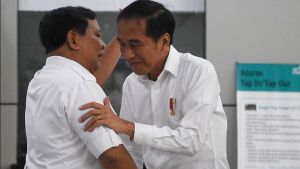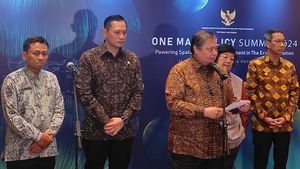JAKARTA - The Indonesian Employers' Association (Apindo) has opened its voice regarding the discourse of a new government under the leadership of Prabowo Subianto, which is rumored to increase the debt ratio to reach 50 percent of Gross Domestic Product (GDP).
This was emphasized by Hashim Djojohadikusumo who emphasized that this increase in debt ratio will be accompanied by an increase in state revenues
APINDO Economic Policy Analyst Ajib Hamdani said that if you look at the state debt data at the position in April 2024 which has reached Rp8,338.44 trillion or equivalent to 38.64 percent of GDP. This position almost touched the debt ratio limit, which is in accordance with Law No. 17 of 2003 concerning State Finance, Indonesia's maximum debt ratio is 40 percent of GDP.
On the other hand, in the DPR RI Plenary Meeting on expressing views on the Macro Economic Framework and the Principles of Fiscal Policy (KEM PPKF) in 2025, in May 2024, the PDI-P faction through Edy Wuryanto noted that ideally the management of the APBN should be directed to a 0 percent fiscal deficit. This means that the APBN is all financed without adding new debt.
"We need to review further, which one is the most realistic In addition to the debt ratio of up to 50 percent of GDP or designing a 0 percent fiscal deficit policy," he said in his official statement, Friday, July 12.
Ajib said that the management of the 2025 State Budget would indeed face a fairly compacted fiscal challenge. At least 3 urgent things make the government's fiscal space very narrow.
First, the debt maturity in 2025 which reached IDR 800.33 trillion, as a result of the COVID-19 pandemic's scarring effect. As well as the 2026 and 2027 APBNs will also face the same maturity debt condition and the state cannot fail in paying debts.
Second, is the burden of the commitment of the sustainable program regarding the capital city of Nusantara (IKN), which will suck up state finances. With the temporary allocation of development based on the strength of the state budget, the government must continue to allocate special funds so that the rhythm of development can continue to run well.
The third is the government's populist program Prabowo Subianto about free nutritious meals. With the ideal initial allocation at IDR 400 trillion, the temporary state budget reality can only be allocated IDR 71 trillion.
Ajib said that for the following years, of course, this program requires a larger allocation of funds. With the existing load structure, the 2025 State Budget has even been designed to experience a deficit in the range of 2.29 percent to 2.82 percent of GDP.
Furthermore, Ajjib conveyed that it needs to be studied more deeply, was Indonesian fiscal able to cover the entire required budget? At least 3 things can be optimized in this fiscal management. The first is an increase in tax revenues.
Ajib menyampaikan peningkatan penerimaan ini dengan cara pemerintah perlu mengidentifikasi grey economy dan melakukan pemajakan yang tepat sasaran.
"Don't just collect taxes at the zoo. Because this will be counterproductive to economic growth. The next thing in this tax increase is to reduce the tax expenditure gradually. In 2024, the tax expenditure projection will reach IDR 374.5 trillion," he said.
According to Ajib, the management of this allocation needs to be streamlined in order to increase overall fiscal capacity.
Furthermore, the second is the increase in Non-Tax State Revenue (PNBP). With abundant resources, this sector revenue can be further increased than the conservative target in 2024 which amounted to Rp492 trillion.
SEE ALSO:
Then the third, is the increase in dividend revenue from State-Owned Enterprises (BUMN). The state as a shareholder of BUMN must have an ideal measuring instrument or benchmarking for dividend revenue.
Ajib explained that the quantitative measure that can be used is how much return on equity (ROE) from each BUMN. With dividends in the range of Rp. 80 trillion, but then withdrawn in the form of State Capital Participation (PMN) of more than Rp. 40 trillion is a management condition that does not reflect the highest and best use management.
"These steps are very likely to be taken when the government implements a consistent good corporate governance (GCG) and political willingness. Hopefully, these steps can cover fiscal deficits of up to IDR 500 trillion every year," he said.
According to Ajib, the 0 percent fiscal deficit narrative is very likely and this is a productive step towards economic independence, compared to the narrative about increasing the debt ratio by 50 percent of GDP.
The English, Chinese, Japanese, Arabic, and French versions are automatically generated by the AI. So there may still be inaccuracies in translating, please always see Indonesian as our main language. (system supported by DigitalSiber.id)
















